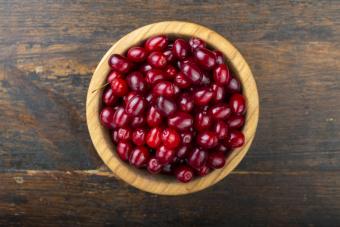
Dogs can eat unprocessed, pitted cherries, but other cherry types could be hazardous. This is a fruit that must be approached with caution.

Benefits of Cherries
The flesh of the cherry, without the pit, contains several beneficial nutrients, including vitamin A, vitamin C, antioxidants, and fiber. The following are the benefits of each nutrient:
- Vitamin A improves eyesight.
- Vitamin C is an antioxidant that can help your dog's body eliminate potentially dangerous free radicals, support healthy aging, and reduce inflammation.
- Anthocyanins, a potent antioxidant found in cherries, are beneficial to brain function.
- Fiber is essential for gut health.
Fresh cherries also contain a significant amount of water content and are low in calories, making them an ideal occasional treat if your dog enjoys the flavor.

The Dangers of Cherries for Dogs
If your dog eats a cherry that's processed and still has the pit inside, a single cherry pit isn't likely to cause cyanide poisoning.
If multiple cherries are consumed, that's when you should watch for signs of cyanide poisoning. Symptoms may include:
- Red gums
- Dilated pupils
- Difficulty breathing
Even if your dog isn't exhibiting any symptoms of cyanide poisoning, it's still a good idea to call the vet and explain the situation. They may choose to have your dog come in to induce vomiting before any symptoms have the opportunity to present themselves.
You should still be on the lookout for an intestinal blockage. If your dog has any blockage, you may notice a decreased appetite and a reduction in bowel movements. Symptoms generally appear within the first 24 hours after your dog has eaten the cherry pit. Keep in mind, small dogs are more prone to intestinal obstruction from the pit than larger dogs.
Cherry-flavored foods should also be avoided. Even if they state they are flavored naturally, many of these food types contain a significant amount of sugar and other additives that aren't healthy for your dog.
How Many Cherries Dogs Can Eat
Dogs can eat one or two cherries at a time, but make sure they're organic and pitted before feeding them to your dog. To make sure your dog doesn't have any adverse reactions, start with half of one. Keep an eye out for stomach pains, urination or bowel movement difficulties, vomiting, or diarrhea. Consult your veterinarian before feeding your dog this food, especially if your dog has any underlying health conditions.

Consult with Your Veterinarian
Dogs can eat pitted, unprocessed, natural cherries. If you purchase cherries that still contain their pits, be certain to remove them prior to providing them to your dog. Keep cherries with pits out of reach of your dog and, if your dog ingests cherries with pits, don't hesitate to call your veterinarian.







